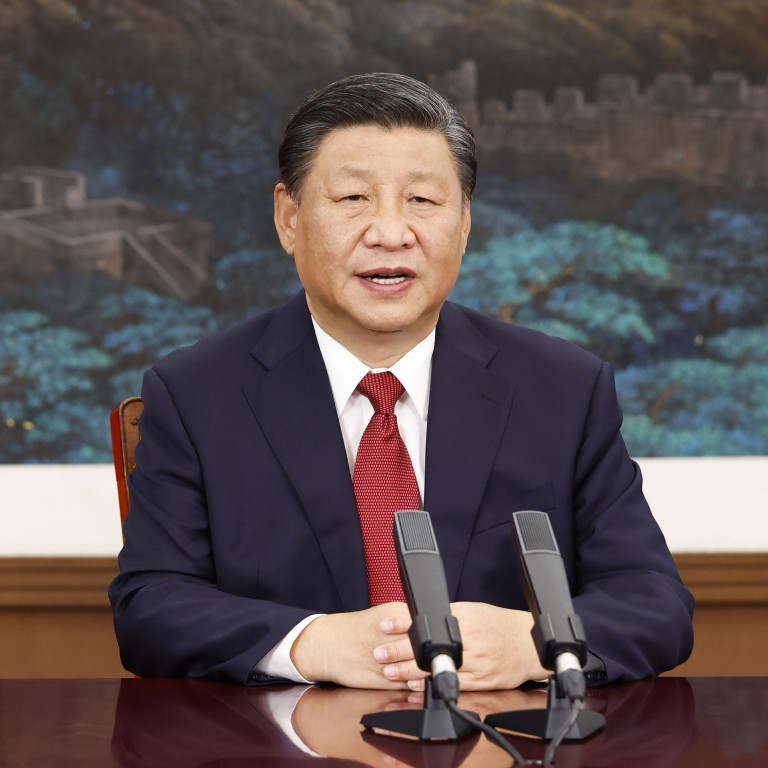
Xi Jinping calls for international tech cooperation to tackle global challenges, amid simmering US tensions
- ‘All countries ... need to open up and cooperate more in science and technology, and jointly explore methods to solve important global problems’ said Xi
- Remarks come as China has been encouraging ‘indigenous innovation’ to reduce its reliance on imported technologies
President Xi Jinping has called for international technology cooperation to tackle global challenges at a time when rivalry between China and the US is heating up.
Xi made his comments on Friday in a video speech to the Zhongguancun Forum in Beijing, an event the city uses to promote technology exchanges, saying China would take a “more open attitude” and take part in “global innovation networks”.
“All countries in the world need to open up and cooperate more in science and technology, and jointly explore methods to solve important global problems,” said Xi. He added that China would encourage Zhongguancun, known as China’s Silicon Valley, to build itself into “a world leading technology park”.

09:40
Tightened regulations among key trends shaping China’s internet in 2021
While Xi did not mention any particular issue, the speech comes at a time when Washington and Beijing are at loggerheads over alleged technology and intellectual property theft by China from US institutions and businesses. At the same time, China has been encouraging “indigenous innovation” to reduce its reliance on imported technologies.
Vice-premier Liu He, widely considered to be Xi‘s right-hand man, kicked off the five-day forum, under the theme this year of “Intelligence, Health and Carbon Neutrality”. Zhongguancun, an area in northwestern Beijing, is home to the country’s top universities, research institutions and hi-tech companies.
It is cradle to multiple Chinese tech giants, including computer maker Lenovo, e-commerce giant JD.com, and TikTok owner ByteDance.
Who is Xi Jinping? Looking for new clues in Communist Party tributes
“Beijing aims to develop the Zhongguancun Forum into a national platform for global communication and cooperation on science and technology innovation,” said Jin Wei, vice-mayor of Beijing, at a news briefing last week.
“During the forum, the world‘s top scientists, Nobel Prize winners, Turing Award winners and Fields Medal winners, representatives of scientific research and academic institutions, leaders of international organisations, entrepreneurs and investors will discuss topics such as the digital economy, life and health, clean energy and sustainable development,” he said.
The official introduction highlights an openness to international cooperation as China seeks to become a world innovation powerhouse by 2035.
06:01
There’s a global semiconductor shortage and this is why it matters
The China Association for Science and Technology, one of the organisers, will expand an “international technology trade alliance” to include 150 member institutions this year from 103 members currently, and “build an effective mechanism to better exchange information and gather resources”, according to a news briefing last week.
This is the second time that Xi has conveyed a message to the forum, which was launched in 2007. His last remarks came in 2019 when he highlighted the significance of hosting the forum to enable discussions on cutting-edge technology, future industry growth trends and ways to help nations share innovative ideas and development concepts.
China’s rejuvenation to the fore as Xi Jinping opens National Games
Many Chinese tech companies, such as telecoms giant Huawei Technologies Co, have been sanctioned by the US over national security concerns and are in danger of losing their overseas markets.
“There is no sign of an easing, in terms of policy, or other initiatives that would suggest an unfreezing of technology tensions,” said Cameron Johnson, an adjunct faculty instructor at New York University and partner at Shanghai-based management consultancy Tidal Wave Solutions.
“I expect tensions to last for years as the US and China continue to mistrust each other, and [as long as] China’s rise is seen as a threat to the US and its allies,” he said.
There has been certain progress though as leaders of both sides have held two phone calls this year. The latest call between Xi and US President Joe Biden, taking place earlier this month, agreed to manage the growing rivalry between their two countries to stop it from devolving into conflict.

